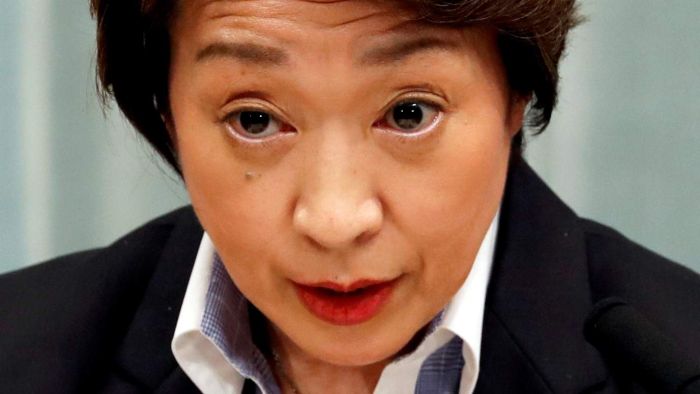Japan’s Olympics Minister Seiko Hashimoto will become the new chief of the Tokyo Olympic organising committee, after former boss Yoshiro Mori resigned for making sexist remarks.
A former prime minister, 83-year-old Mr Mori stepped down after causing an outcry by saying during an Olympic committee meeting that women talk too much, which he found annoying.
Seiko Hashimoto brings a strong Olympic pedigree to the role.
She is a bronze medallist and seven-time Olympian, having competed in both the winter and summer games.
“I will spare no effort in making the Tokyo games successful,” she told the Tokyo 2020 executive board after it voted on her becoming its new president.
“It has to be a safe and secure games that we have to remain first and foremost and consider how we can control COVID-19.
“This is the first games to be postponed in the history of the Olympics and Paralympics, so the question is how we can learn lessons out of that new experience?”
Ms Hashimoto has also served as the Minister for Women’s Empowerment for the Japanese Government.
She took part in four Winter Olympics as a speed skater and three Summer Olympics as a cyclist.

Organisers wanted a new leader who had a deep understanding of gender equality and diversity, following the outcry over Mr Mori’s comments.
“I’ll work closely with my new successor the new minister so we can create the organising committee that will be trusted by both domestic and international audiences,” she said.
“I want to [make sure that] the diversity and harmony is the major spirit guiding the Tokyo games.
“We should create a society that can live in harmony and I hope that will be a legacy for the future.”
Yoshiro Mori causes an uproar
Mr Mori raised eyebrows during an online meeting of the committee’s board of trustees earlier this month during a discussion about its plan to increase the number of women on its board.
“The Education Ministry has been very insistent about choosing female directors. But a board meeting with plenty of women will make it drag on,” he said.
“Women have a strong sense of rivalry. If one [female] member raises her hand to speak, all the others feel the need to speak, too. Everyone ends up saying something.”
After an outcry in Japan, Mr Mori initially apologised, defying calls to step down.




But mounting pressure from the Japanese public and Olympic sponsors eventually forced his hand, despite the International Olympic Committee initially accepting Mr Mori’s apology as the end of the matter.
Today, Tokyo 2020 organising committee vice-president Toshiaki Endo said it had been hugely damaging to lose its president five months before the summer games open.
At the start of a Tokyo 2020 board meeting, he said Mr Mori’s remarks had been inappropriate and a new president should be selected as quickly as possible.
“With only five months to go, his resignation inflicted indescribable damage to the preparation process for the Olympic Games,” Mr Endo said.
The games have been beset by problems
The games are set to begin on July 23.
Organisers have said they will go ahead despite the pandemic, while opinion polls have persistently shown most Japanese oppose holding the event this year.
This sexism scandal was the last thing organisers needed given the substantially unfavourable sentiment.
The comments stole the spotlight from what should have been a positive announcement, being reported on the day officials released their ‘playbooks’ containing plans to ensure the games could be held safely.
The Tokyo Olympics and Paralympics will be games like no other, with athletes required to restrict their movement wear a mask at all times unless they are eating, sleeping or outdoors.
They will also sound like no other, with organisers wanting people to show their support by only clapping their hands and not by chanting or singing.
The Japanese and Tokyo governments are expected to make a decision on whether spectators can attend in the next few weeks.
The country’s vaccination program is now underway, but it’s not clear how many people will receive jabs before the games.
The Japanese Government and Tokyo organisers say vaccination numbers will not have any bearing on their plans.







